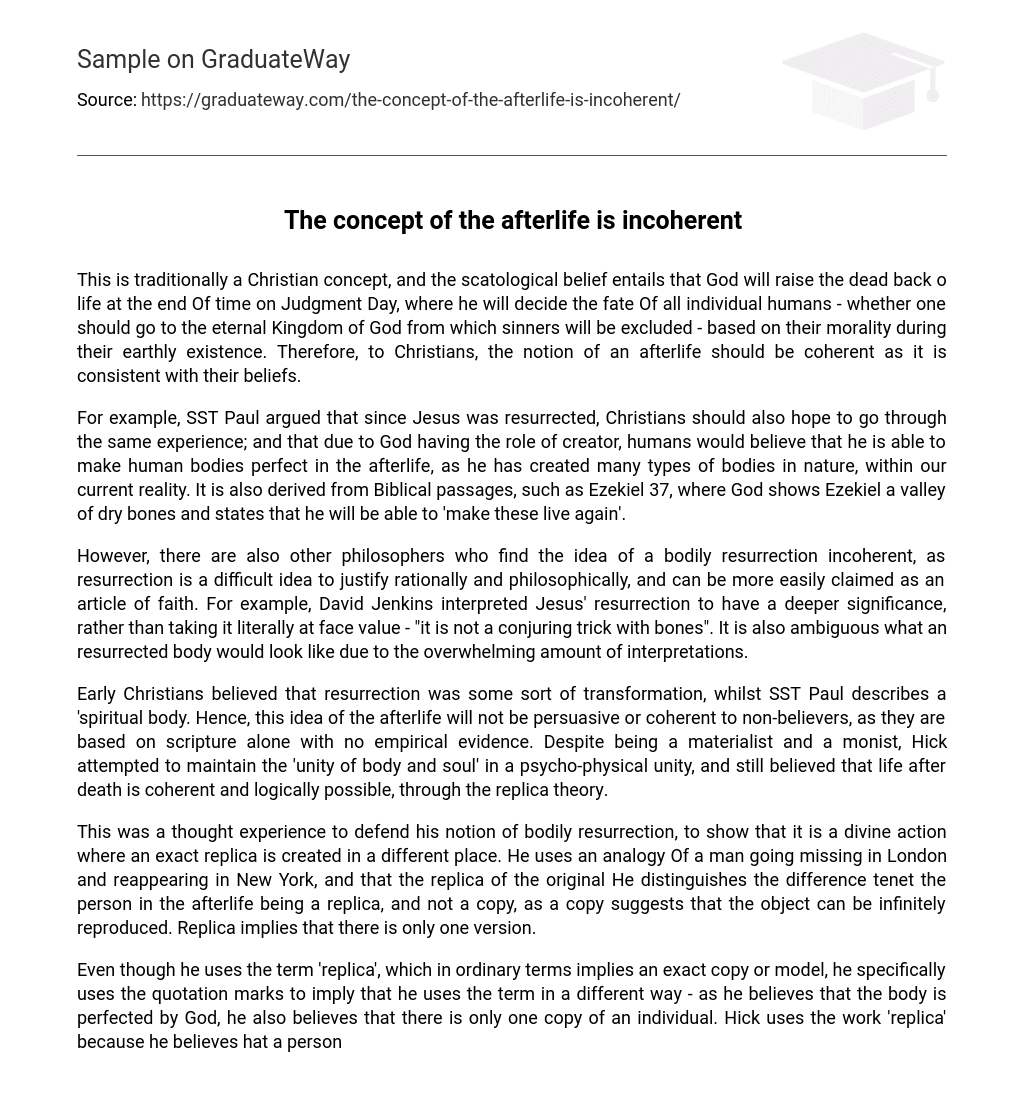This is traditionally a Christian concept, and the scatological belief entails that God will raise the dead back o life at the end Of time on Judgment Day, where he will decide the fate Of all individual humans – whether one should go to the eternal Kingdom of God from which sinners will be excluded – based on their morality during their earthly existence. Therefore, to Christians, the notion of an afterlife should be coherent as it is consistent with their beliefs.
For example, SST Paul argued that since Jesus was resurrected, Christians should also hope to go through the same experience; and that due to God having the role of creator, humans would believe that he is able to make human bodies perfect in the afterlife, as he has created many types of bodies in nature, within our current reality. It is also derived from Biblical passages, such as Ezekiel 37, where God shows Ezekiel a valley of dry bones and states that he will be able to ‘make these live again’.
However, there are also other philosophers who find the idea of a bodily resurrection incoherent, as resurrection is a difficult idea to justify rationally and philosophically, and can be more easily claimed as an article of faith. For example, David Jenkins interpreted Jesus’ resurrection to have a deeper significance, rather than taking it literally at face value – “it is not a conjuring trick with bones”. It is also ambiguous what an resurrected body would look like due to the overwhelming amount of interpretations.
Early Christians believed that resurrection was some sort of transformation, whilst SST Paul describes a ‘spiritual body. Hence, this idea of the afterlife will not be persuasive or coherent to non-believers, as they are based on scripture alone with no empirical evidence. Despite being a materialist and a monist, Hick attempted to maintain the ‘unity of body and soul’ in a psycho-physical unity, and still believed that life after death is coherent and logically possible, through the replica theory.
This was a thought experience to defend his notion of bodily resurrection, to show that it is a divine action where an exact replica is created in a different place. He uses an analogy Of a man going missing in London and reappearing in New York, and that the replica of the original He distinguishes the difference tenet the person in the afterlife being a replica, and not a copy, as a copy suggests that the object can be infinitely reproduced. Replica implies that there is only one version.
Even though he uses the term ‘replica’, which in ordinary terms implies an exact copy or model, he specifically uses the quotation marks to imply that he uses the term in a different way – as he believes that the body is perfected by God, he also believes that there is only one copy of an individual. Hick uses the work ‘replica’ because he believes hat a person can only exist in one place and time, as our identities are unique. Hence, our replica is the real person, as part of being a human is having an individuality, which would be undermined if there were a multiple copies of ourselves in the afterlife.
Many would argue that the human body is the source of flaws and limitations, which would mean that the afterlife may be better off consisting of non-material souls, with the body being discarded as unimportant in comparison. This is called an disembodied existence, where the body is temporary and the soul is eternal. The philosophical view hat the soul/mind exists separately from the body is called dualism. Dualism is the belief that body and soul and the mind are separate entities.
Plato presents arguments for the immortality of the soul- the cyclical argument, which deems that everything comes into existence from its opposite (e. G. Awake and asleep, dead and alive), which makes the cycle of birth and death coherent; and the recollection argument, where Plato believed that the knowledge we acquire is not learned, but recollected or remembered from the realm of forms before coming into the body, using the example of a slave ay who has no education, but can grasp complex mathematical concepts.
The belief that we can survive without a body is also advocated by Richard Sinecure, as he draws a line between thoughts and actions, suggesting that consciousness can exist independently of the body. He also claims that surviving outside the body is a logical concept – because we can imagine it, it is possible (l know, I know). He also says that our use of language points to body and soul being separate; we say ‘l have a body’, not ‘l am a body’. However, Brian Davies criticizes Sinecure’s view as incoherent, because just cause we imagine something does not mean it is therefore possible.





